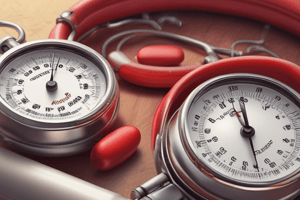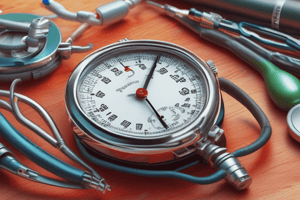Podcast
Questions and Answers
What is primarily considered a chronic disease among patients with blood pressure issues?
What is primarily considered a chronic disease among patients with blood pressure issues?
- Diabetes Mellitus
- Coronary artery disease
- Hypertension (correct)
- Hyperlipidemia
Which of the following lifestyle changes is NOT mentioned as a part of the initial treatment for hypertension?
Which of the following lifestyle changes is NOT mentioned as a part of the initial treatment for hypertension?
- Caloric restriction
- Stress reduction
- Healthy diet
- Increased alcohol consumption (correct)
What does untreated hypertension primarily lead to in the body?
What does untreated hypertension primarily lead to in the body?
- Improved kidney function
- End-organ damage (correct)
- Enhanced cardiac performance
- Increased exercise tolerance
Which of the following conditions is associated with advanced atherosclerosis of the cerebral arteries?
Which of the following conditions is associated with advanced atherosclerosis of the cerebral arteries?
What is the impact of hypertension on renal arteries?
What is the impact of hypertension on renal arteries?
What is the relationship between hypertension (HT) and type 2 diabetes mellitus?
What is the relationship between hypertension (HT) and type 2 diabetes mellitus?
Why is hypertension often referred to as 'The Silent Killer'?
Why is hypertension often referred to as 'The Silent Killer'?
What effect does lowering blood pressure (BP) have on cardiovascular health in individuals with HT?
What effect does lowering blood pressure (BP) have on cardiovascular health in individuals with HT?
What is a common issue faced by patients undergoing antihypertensive therapy?
What is a common issue faced by patients undergoing antihypertensive therapy?
How significant is the impact of reducing BP on the risk of stroke?
How significant is the impact of reducing BP on the risk of stroke?
Flashcards are hidden until you start studying
Study Notes
Overview of Hypertension
- Hypertension (HT) is a chronic disease with varying severity and progression among patients.
- Often asymptomatic in stages I and II, signs of HT emerge late, indicating extensive end-organ damage.
Risk of Untreated Hypertension
- Untreated HT leads to damage in blood vessels, heart, and kidneys, increasing the risk of significant health complications.
- Atherosclerosis accelerated by HT can result in strokes and heart disease such as myocardial infarction and heart failure.
Comorbidities and Complications
- Over 11 million Americans experience both hypertension and type 2 diabetes, which elevates risks for serious conditions like strokes and renal issues.
- Maintaining blood pressure in the normotensive range is critical when both HT and diabetes coexist.
Importance of Treatment
- Effective BP management can slow down the progression of vascular and cardiac lesions, reducing morbidity and mortality.
- Essential hypertension is often referred to as "The Silent Killer" due to its asymptomatic nature, which complicates treatment adherence.
Prevalence and Impact
- Hypertension is the most common cardiovascular condition, affecting approximately 50-60 million people in the U.S.
- A global estimate indicates that one billion people have hypertension; prevalent mostly in developing countries.
Treatment Outcomes
- A modest reduction in BP (4-6 mmHg) over several years can significantly lower stroke risk (42%), heart attack risk (16%), and total vascular mortality (21%).
Medication Compliance Issues
- Awareness is low, with nearly 30% of individuals unaware of their hypertension; inadequate treatment affects 27% of those diagnosed.
- Education regarding disease consequences is vital for improving adherence to prescribed antihypertensive therapy and lifestyle changes.
Blood Pressure Guidelines
- Blood pressure categories are defined as:
- Normal: <120/80 mmHg
- Elevated: 120-129/<80 mmHg
- Stage 1: 130-139/80-89 mmHg
- Stage 2: ≥140/≥90 mmHg
- Medication may be prescribed for Stage 1 if accompanied by cardiovascular risks or comorbidities.
Measurement Techniques
- BP should be measured in multiple positions (supine, standing, sitting) and arms during initial assessments to ensure accuracy.
- Automated BP monitoring devices aid in detecting hypertensive crises and assessing medication effectiveness.
Types of Hypertension
- Essential (Primary) Hypertension comprises 90% of cases; secondary hypertension arises from other medical conditions like renal disease or drug effects.
Drug-Induced Hypertension
- Medications that may elevate BP include:
- Alpha1-agonists, high-dose steroids, NSAIDs, stimulants, and certain antidepressants.
- Birth control pills can increase BP due to angiotensinogen synthesis.
Non-Pharmacological Treatment
- Lifestyle modifications such as reducing salt intake, managing weight, and addressing sedentary habits are essential in managing hypertension.
- Modifiable risk factors include stress, obesity, glucose intolerance, and alcohol consumption, while non-modifiable factors encompass age, gender, and family history.
Studying That Suits You
Use AI to generate personalized quizzes and flashcards to suit your learning preferences.



